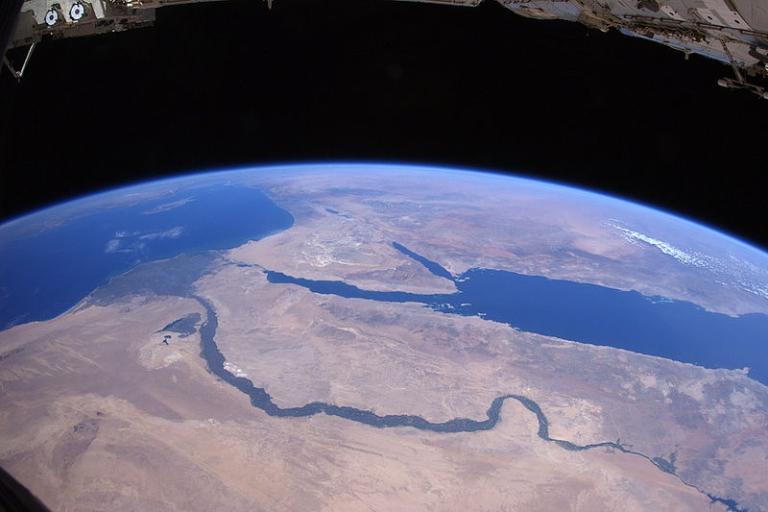
(Wikimedia Commons public domain)
First of all, I want to say something about the photograph above, which I really like:
Running across the photo are, to the right of center, the Red Sea, with its two antenna-like arms extending toward the left — the upper one being the Gulf of Aqaba (or, if you’re an Israeli, the Gulf of Eilat), and the lower one being the Gulf of Suez. They enclose the Sinai Peninsula, above which you can see the relatively green land of Israel along the eastern coast of the Mediterranean Sea. (If you look carefully along the line of the Gulf of Aqaba/Eilat and go just a bit further, you’ll find the very tiny — and rapidly shrinking –Dead Sea.)
Running more or less parallel to the Red Sea, you’ll find the green “snake” of the Nile River Valley, culminating in the Nile Delta where the river flows into the Mediterranean at the left. (There’s a little green place not far from the Delta that’s off just a slight bit by itself. That’s the Fayyum Oasis.)
But you should also notice that, apart from the Nile River Valley, the Fayyum, and the Delta, Egypt is overwhelmingly brown. That’s the Sahara Desert. Sahara is the plural form of the Arabic word sahra’, which means “desert.” It makes the Mojave Desert in southern California and the desert around Las Vegas look like a tropical rain forest by comparison.
And now, with that in place, I would like to present yet another (to me) redundant illustration of how government incompetence can destroy an economy and hurt a people:
And, while I’m on that theme, let me share a story.
First, though, the set-up:
A few days ago, I posted an entry here entitled “Three comments from Milton Friedman.” One of those three comments from the late, great Nobel laureate in economics and advocate of free markets was this witty little item:
“If you put the federal government in charge of the Sahara Desert, in five years there’d be a shortage of sand.”
One of my readers took strong and, I thought, somewhat indignant exception to that joke.
But I’ve personally experienced the truth of Professor Friedman’s point.
Right after we were married, my wife and lived in a suburb of Cairo, Egypt, for several years. Our apartment for almost that entire time was located directly across the street from the campus of the international school there, and, during one period of several months, a new building was under construction only a few score yards away from where we lived.
In the summer, Egypt can be rather warm, so we typically slept with our windows open in order to snare a bit of breeze. But, for a while, we were continually awakened by the sound of dump trucks outside our window, right in the middle of the night.
Exasperated, I finally approached the school’s headmaster, whom I knew — my wife was teaching for him — and asked him why in the world they couldn’t arrange for the delivery of whatever it was they were receiving for, say, some time during normal daylight working hours.
“Oh,” responded. “You don’t understand. Those dump trucks are dropping off construction sand, which is a government monopoly. There’s a queue to get it that’s several years long, so we’ve paid bribes to the relevant officials and those are black market deliveries.”
I immediately recognized this as a parade example of government’s ability to wreak economic havoc.
Creating a sand shortage in Egypt? Surely that has to rank as some sort of miracle.












